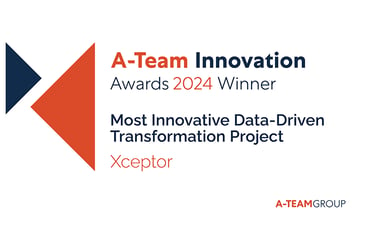Data is growing faster than anyone expected. According to a recent survey from WBR Insights, 62% of respondents from financial organizations consider rapid data growth to be the biggest challenge to their data management initiatives.
On one hand, this represents tremendous progress in digital transformation and technological advancement. But it also means that data quality management, already a formidable challenge for financial services firms, is only getting more difficult.
Fortunately, a new generation of data quality technologies has entered the market. Augmented data quality (ADQ) solutions leverage AI and ML to enhance and scale data quality efforts.
In this article, we'll explore how ADQ helps organizations improve data accuracy and risk management and compliance, as well as the need to lay the groundwork through quality data management practices.
Why data quality is so hard (and getting harder)
The financial services industry has always faced unique challenges in data quality management. Organizations deal with vast amounts of unstructured data, from data gathered during client onboarding to contracts, balance sheets, and trade confirmations. Such data is much harder to process and utilize than structured data, which arrives in standardized formats.
Today, data volumes are growing, and architectures are more complex than ever. As firms integrate more specialized technologies, they may be dealing with data coming from thousands of different systems. Data types and formats vary widely. Even data from the same third-party vendor can change in format over time.
And data quality — always a top priority — is only becoming more important as organizations integrate artificial intelligence (AI) and machine learning (ML) into daily operations. Good data quality is the bedrock of effective AI.
In the past, organizations relied on traditional data quality tools and manual processes to ensure data quality. As data volumes and complexity grow, this approach simply isn't scaling. To keep up with growing data demands, organizations need to invest in a strong data quality management strategy that provides a foundation for additional data quality approaches.
First things first, data quality management
Financial services firms must first focus on prioritizing data quality management. Solutions tailored to the industry, such as Xceptor's intelligent data automation platform, provide firms with orchestration, data management, and AI control and governance. This serves as a bedrock for augmented data quality (ADQ), laying the foundation of effective governance and maintenance strategies.
Financial services firms face ever-evolving regulations and increasing volumes of data. That means effective data management quality strategy is a core component of ADQ, allowing organizations to remain in compliance while ensuring that all data moving upstream is accurate.
Xceptor provides effective data management, enabling organizations to handle complex processes. The platform's AI orchestration layer provides the ability to manage complex workflows and enables interoperability with legacy systems, people, and AI.
Xceptor extracts data from unstructured documents, then transforms that data through correction, enrichment, validation, and calculation to increase overall accuracy. This is a core component of effective AI usage.
Furthermore, auditability is essential to AI, particularly for enterprises in highly regulated industries, such as financial services. Xceptor provides additional controls and governance in place, such as detailed audit trails and confidence thresholds, that provide full visibility and enable "human in the loop" review as needed.
How augmented data quality builds off of data quality management
Augmented data quality (ADQ) offers organizations a solution to the challenge of growing data volumes and complexity. With a strong data quality management strategy in place, organizations are well-positioned to reap the benefits of AI-powered ADQ.
What is augmented data quality (ADQ)?
ADQ technology leverages AI and ML to streamline, improve, and accelerate data quality efforts. There is a wide variety of ADQ solutions on the market. Basic solutions offer matching capabilities to fix inconsistencies such as company or ticker names and addresses. More advanced solutions focus on observability, freshness, anomaly detection, and outlier analysis.
Critically, "augmented" data quality is just that — it helps financial institutions reduce the manual effort of data quality while keeping humans in the loop. Solutions typically offer the ability to set confidence levels, which determine when a human is brought in to review a match or fix.
The benefits of ADQ
By incorporating AI and ML into data quality efforts through ADQ, organizations can:
Improve data accuracy
ADQ can identify and rectify errors such as typos, duplicate entries, and inconsistencies more effectively than traditional processes. ADQ's predictive models even enable organizations to fill in missing data points and match entities across systems with a high degree of accuracy.
Reduce costs and manual efforts
In a recent webinar hosted by A-Team, Xceptor's Senior Product Manager, AI and Data Automation, Gil Cross noted that one of the major challenges of data quality is "bringing down the number of human touchpoints". ADQ allows organizations to significantly reduce the amount of manual effort required to manage data quality, minimizing the likelihood of human error and reducing costs.
Improve risk and compliance management
Poor data quality can even affect regulatory compliance. "I haven't always seen it called out as data quality," said Ellen Gentile, Data Quality Team Leader at Edward Jones, in the webinar. Yet when inaccurate and inconsistent data flows downstream, organizations face regulatory risk.
AI-powered ADQ can help organizations fix bad data before it affects analysis, operations, and reporting, in turn reducing risk and boosting compliance. ADQ can also help organizations capture detailed audit trails and improve data lineage and traceability to further satisfy regulatory requirements.
The role of AI in ADQ
Here's how AI enables ADQ to accelerate and improve data quality management:
Automate data cleansing
AI and ML models can identify outliers, inconsistencies, and data points that don't fit expected trends in datasets, all of which may indicate errors. When issues are identified, AI can automatically correct common errors, predict and fill in missing values, resolve entities across datasets, and deduplicate data (with human intervention as needed to ensure accuracy).
Data monitoring and profiling
AI can rapidly analyze data to create profiles that describe distribution, patterns, and characteristics. With AI-powered data monitoring, organizations can monitor data pipelines to identify potential issues in real-time.
Data enrichment
AI can enhance datasets by integrating data from external sources. This includes entity resolution across multiple datasets to ensure standardization — for example, identifying that a misspelled or misformatted address in a new dataset is the same as an address in an existing data source.
Natural language processing (NLP)
AI is particularly suited for managing the quality of unstructured and semi-structured data because it can understand human language. NLP helps correct typos and ensure consistency in text strings and unstructured data. It also supports named entity recognition (identifying entities such as people and organizations within text) and data classification.
However, as Callum Conejo-Watt, Data Governance & Quality Lead, Lombard Odier Asset Management, pointed out in the webinar, "I don't know if we'll ever be comfortable with just letting AI do the final sign off," and will likely "see AI more as an assistance tool rather than the end point."
How Schroders used intelligent data automation to increase data integrity and reduce manual efforts
At Schroders, a global asset manager, the operations innovations team wanted to improve data integrity while reducing manual efforts. The firm, which manages over £726.1 billion in wealth and investments, relied heavily on manual processes to manage immense amounts of complex data — leaving room for error and negatively affecting costs, customer satisfaction, and efficiency.
Schroders partnered with Xceptor to eliminate manual processes while mitigating data integrity risks. Data is now seamlessly captured across file types and channels, significantly reducing the manual workload. Xceptor's intelligent data automation platform validates captured data to reduce data integrity risks. Now, data management isn't just meeting baseline data governance protocols, but improving on them.
With Xceptor, Schroders is processing more transactions with greater speed and efficiency, while simultaneously reducing the risk of errors.
Getting started with intelligent data quality management
To learn more about how advances in AI can bolster your approach to data quality management, tune into A-Team's recent webinar featuring Xceptor's Gil Cross and other data experts. If you're ready to get started, book your demo with our experts today.



